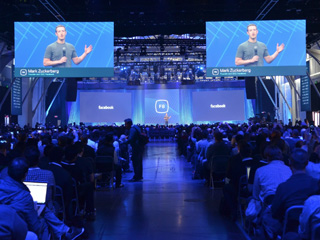
Facebook’s F8 Conference. Photo courtesy developers.facebook.com.
Video hosted and shared on Facebook is changing.
While Facebook has been a valuable marketing tool for films and filmmakers since 2008 when they rolled out Facebook Film (since re-named), Facebook has still been considered a “walled garden” that’s painful to search and continues to play catch-up to many other video delivery networks.
At the first of two days of the F8 Conference, Facebook announced a few worthwhile upgrades that are relevant to filmmakers and, more specifically, anyone uploading video within Facebook instead of embedding or linking another video (e.g. YouTube, Vimeo, etc.).
Here’s what caught our eye in yesterday’s announcement on brand-new ways to use video on Facebook:
- Until yesterday’s announcement, video uploaded to Facebook was not embeddable on other websites; now it is (documentation); it’s unclear if embed views count toward the view counter
- You can now “set an expiration date for a video and retain insights after takedown (currently in beta),” which might be a creative tool for filmmakers and other video content providers (read: advertisers)
- As of yesterday, you can “restrict the audience of a video by age, gender, and location,” which opens up a whole can of worms for why one might do that
- Playing catch-up with YouTube (which allows only its verified users — a fairly easy process) to pick their own video’s poster frame, Facebook now allows you to “add custom thumbnails for videos” rather than getting stuck with a random frame grab
Here’s a punch-list to get up to speed on how video on Facebook can help filmmakers:
- Facebook recently provided an optional “call to action” after a video ends, allowing some choice over what to do next (source); they also work for Facebook Pages and include “Book Now,” “Contact Us,” “Use App,” “Play Game,” “Shop Now,” “Sign Up,” and “Watch Video” — all of which allow for leaving Facebook (source)
- As of December 2014, Facebook has a department called Facebook Media, which promotes the movers and shakers (or business partners?) using Facebook for video
- As of December 2014, video began to auto-play while muted (source, 12/24/2014); this was followed soon after by 15-second auto-playing video advertisements (source, 3/13/2014)
- As of December 2014, select Facebook Pages can feature a video front-and-center and also have YouTube-esque playlists (Source, 12/24/2014) but it’s a very slow roll-out for public, non-partner Facebook accounts; this may be fast-tracked in yesterday’s announcement, which says “manage featured videos and playlists for a Page” (source, 3/24/2015)
- As of May 2014, Facebook began to roll out Video Insights, which show retention per second and other stats (source)
Finally, in rare circumstances, some filmmakers or film companies may be invited to participate in “Facebook Live,” which is essentially a comment box alongside a live-streamed video but isn’t a feature that’s available to the general public:
- Back in 2008, Facebook featured a creative project by Spike Jonze
- While there’s now a lot more competition in social viewing experiences (e.g. uStream, LiveStream, etc.), they’ve just recently had video-specific live events for the 2015 Academy Awards and Game of Thrones Season 4 and now Season 5 (aka watching the red carpet premiere), which essentially provided a mini-feed alongside the live-streaming video player
But what’s wrong with all of the above? Show me the money.
What’s still missing from Facebook is monetization. Facebook “likes” and “views” may appear to be good, but still not in the pocketbook.
“The new stuff looks great but at the moment it’s vaporware. There’s a huge ecosystem around YouTube,” notes Daniel Keywan Hollister, who works at RocketJump and is a co-founder of 5-second Films. (By ecosystem, that’s referencing the search, users, money, and services that YouTube provides.)
“If we got a ton of views on Facebook and then those people didn’t watch it on YouTube, we’ll have lost money and the view count. We may put stuff on Facebook if we can still monetize it the same and whatnot, but there’s still so much more than just that over the last few years, especially for bigger channels like RocketJump. There’s a lot of merit to the ‘long tail’ effect and having our stuff everywhere, but there’s also a huge value to being a juggernaut on YouTube even if we’re nowhere else.”
Any thoughts on Facebook’s move with video that may help or hurt filmmakers?


Got something to add?